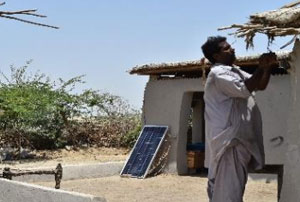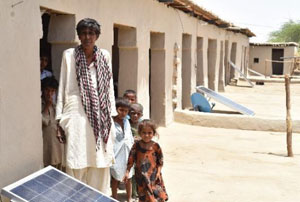“After installation of the solar power units in our community, our income has increased. We are saving money because ofa concept that was unknown to us, just a few months ago. This has also provided us an opportunity to save our traditional skill: “ralli-making”, Chatoon said excitedly.
Chatoon is a leader of 30-odd household village, Goth Shiv Mandir – Umerkot, a remote location in Sindh. Ralli is a traditional quilt-making art – a shared passion of women from the area – exhibiting their natural creativity, love for the color, and traditional motifs.
ARTS Foundation, with the help of Ambassador’s Fund Grant Program (AFGP), identified 150 households in 10 villages – including that of Chatoon – of Bheel community and installed solar systems to power one fan and two light bulbs. The intervention has had a significant impact on the community members’ lives.

The average monthly income of Bheel household is around Rs. 5,000 (US$ 33). Describing their woes, he says, “Everyone needs light to carry on with their lives. Before the systems, lighting our households was one of our major budget heads. We had to buy battery-powered torches or burnt fuel wood, costing us more than Rs. 600 (US$ 4) per month.”
Chatoon explains, “We are low-caste Hindus, forced to work as peasants in the fields of our waderas (landlords). Our employment and living conditions are almost slavish. Poverty has forced us to take loans from the landlords.” The members of the community are involved in farming, the only occupation that has been passed down from father to the son and mother to the daughter for countless generations, other than ralli-making.
Their women have perfected the art of making ‘ralli’, a craft passed down from generation to generation. The women spend each free moment they can get, in making it, to earn extra money. Chatoon says, “Women tend to the housework, their children and work in the fields. If they get some time out of all this, they spend it in making ralli. Each piece fetches around Rs. 200 (US$ 1.3). The money goes directly in their pockets which they mostly use for grooming themselves. Before we got these systems, most of the time, our women did not find time to make ralli as light goes away with the sun.” he adds.

These days, Chatoon and many other community members are planning initiatives that will uplift their community.
With a blush on his face, Chatoon adds, “I am the only one in our Goth who graduated from high school. After I am done with my field work, children gather at my house to get help with their homework – usually after sunset.”
“The solar bulb in my house is a beacon of hope. My house has become a ”Town Hall” of sorts where we (community members) sit together and find solutions to different problems we face,” says Chatoon, leader of the Bheel community.




















